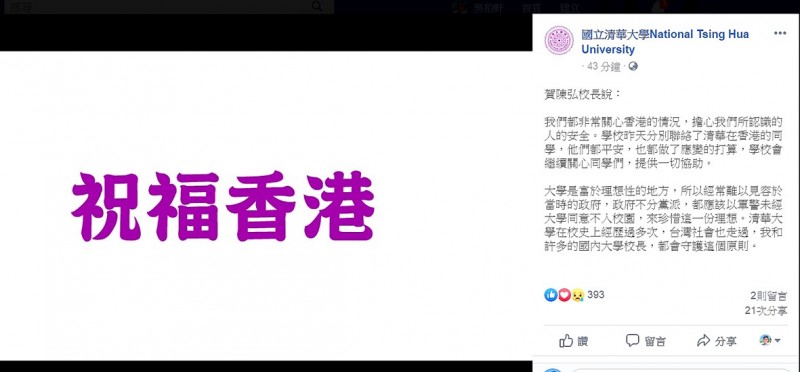《TAIPEI TIMES》 Schools say no to police, military force on campus

National Tsing Hua University’s Facebook page on Thursday shows a message from its president, Hocheng Hong, and his best wishes for Hong Kong. Screen grab from National Tsing Hua University’s Facebook page
SAFE GROUND: Condemning the violence in Hong Kong, the heads of the nation’s top universities said that law enforcement authorities must respect school autonomy
By Wu Po-hsuan and Dennis Xie / Staff reporter, with staff writer
Following the turmoil on Hong Kong university campuses earlier this week, the presidents of the nation’s leading universities reiterated that they would not allow unsolicited military and police forces to enter campus grounds.
The statement came in the wake of the fierce clashes between police, students and protesters on a number of university campuses in the territory on Monday and Tuesday, including at the Chinese University of Hong Kong and the University of Hong Kong.
National Tsing Hua University president Hocheng Hong (賀陳弘) on Thursday expressed his concerns for Hong Kong on the university’s Facebook page.
Universities are a hotbed of idealism and might often be at odds with the government, but the government should — regardless its party affiliation — keep military and police forces off campuses as a show of respect for such idealism, he wrote.
National Taiwan University (NTU) president Kuan Chung-ming (管中閔) agreed, saying that no military or police personnel has the right to enter NTU grounds without first obtaining his approval.
National Taiwan Normal University (NTNU) knows what political oppression feels like as it was a victim in the April 6 Incident, which led to nearly two decades of indifference among NTNU students toward national and social issues, said its president, Wu Cheng-chih (吳正己).
Wu was referring to the April 6, 1949 incident when police and military entered the NTU and NTNU campuses and arrested more than 400 students suspected of engaging in underground communist activists. Seven were executed by firing squad.
The incident also marked the beginning of the White Terror era, with the then-Chinese Nationalist Party (KMT) regime declaring martial law on May 20 that year.
As a university is a cradle for future pillars of the nation, as well as a platform for intellectuals to voice their opinions, military and police interference in the exercise of freedom of speech can have a chilling effect on students and academics, which would hinder national development, Wu said.
Maintaining a safe university environment is a consensus in Taiwan, National Cheng Kung University Su Huey-jen (蘇慧貞) said, adding that security guards at the university are all told on their first day at work that military and police personnel cannot enter the campus without the school’s permission.
Only totalitarian regimes would send the military and police into schools, National Sun Yat-sen University president Cheng Ying-yao (鄭英耀) said.
As a school president, it is his obligation to fend off any political interference in an academic environment, he said.
China’s suppression of young people and surveillance of academics in Hong Kong have had a negative impact, he said, highlighting the value of Taiwan’s hard-earned democracy.
University autonomy is a consensus among Taiwanese schools, Shih Chien University president Michael Chen (陳振貴) said.
Taiwan and Hong Kong are different, as the latter was handed over to China 22 years ago in accordance with the treaty between the UK and China, while Taiwan is a democracy, he added.
National Yang-Ming University follows the same principle, president Steve Kuo (郭旭崧) said, adding that the situation in Hong Kong stems from long-term dissatisfaction, prompting people to take action to fight for a better future, despite the heavy cost.
新聞來源:TAIPEI TIMES

















